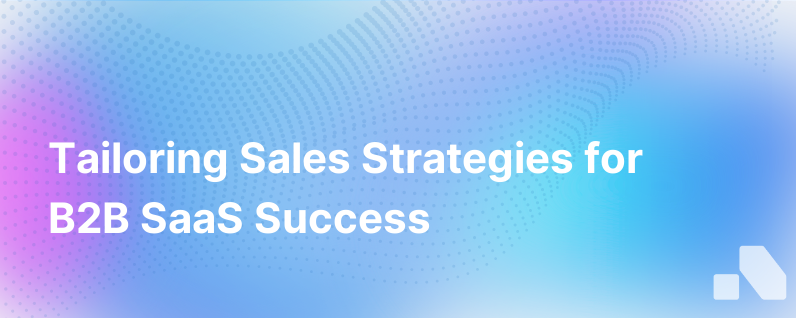Customizing Your Sales Strategy for B2B SaaS Markets
Published on November 28, 2023 by Sawyer Middeleer
The business-to-business (B2B) Software as a Service (SaaS) marketplace has become remarkably competitive, and for early-stage startups or established corporations alike, crafting a sales strategy tailored to the digital era's demand for speed, efficiency, and personalization, is non-negotiable.
The traditional, one-size-fits-all sales approach doesn’t cut it anymore. B2B SaaS customers are looking for solutions that aren't just good—they must be the right fit for their distinct business challenges and objectives. A deep understanding of the customer's journey and a data-driven mindset are now the cornerstones of any successful sales strategy.
In this verbose dive, we will explore how B2B SaaS companies can design a sales strategy that is both agile and customer-centric.
1. Know Your Customer Intimately
The SaaS model is predicated on long-term customer engagement—noting that implying the initial sale is essential, it’s the ongoing relationship that ultimately determines success. Detailed buyer personas should guide every touchpoint. What are their pain points? What outcomes are they after? Which online communities do they inhabit? What is their organizational structure like? Profiling your ideal customer sets the stage for all other strategies.
2. Embrace a Consultative Sales Approach
Gone are the days of hard-selling techniques. In the B2B SaaS market, a consultative approach is key. Your sales team needs to act as trusted advisors—executives who can delve into another company's business model and suggest ways to optimize it. It’s not just about listing off your product’s features; it’s about tailoring a solution that aligns with the potential client’s strategic goals.
3. Tailor Your Value Proposition
The value proposition for your SaaS product must be clear, concise, and compelling. This proposition should unmistakably articulate not just the functions of your software but also the business outcomes it delivers. How will it drive revenue growth, cut costs, improve the customer experience, or streamline operations? Be prepared to present case studies and data that support your claims.
4. Optimize Onboarding and Customer Support
Acquiring a new customer is just the first step. SaaS sales strategies must include meticulous onboarding processes that ensure new customers see value from your product as quickly as possible. Furthermore, customer support should be rejigged to be proactive, anticipating issues before they become problems and providing seamless assistance that reinforces value.
5. Leverage Content Marketing and Thought Leadership
Creating educational content that addresses industry pain points highlights your expertise and contributes to lead generation. This content should be geared towards guiding potential clients through the buyer’s journey—awareness to consideration to decision.
6. Employ a Multichannel Approach
Customers interact with brands across various channels, and your sales strategy should incorporate an omnichannel presence. The key here is consistency. The brand image, the level of service, and the value proposition should be homogeneous, whether the customer encounters your business on LinkedIn, reads an email, or attends a webinar.
7. Experiment with Pricing Flexibility
SaaS pricing strategies are a vital component of overall sales strategy. Consider various pricing models like flat-rate, usage-based, tiered, or per-user pricing to accommodate different customer needs, and be open to experimentation. Transparent pricing, coupled with a flexible model that grows with your users, tends to foster trust and long-term relationships.
8. Use CRM Systems and Automation Tools Wisely
A Customer Relationship Management (CRM) system is indispensable for tracking interactions with current and potential customers. This data aids in identifying trends, forecasting sales, and fine-tuning the sales process. Meanwhile, leveraging automation for routine tasks enables the sales team to focus on creating more personalized experiences for leads and customers.
9. Cultivate Customer Feedback Loops
Proactively seek customer feedback to iterate on your product. This feedback loop can inform more than just product development—it can provide insights into your sales strategy, customer service, and even your marketing approach.
10. Prioritize Analytics and Metrics
From the outset, identify key performance indicators (KPIs) and metrics to track. What constitutes a conversion? How long is the sales cycle? What's the average lifetime value of a customer? Harnessing these metrics allows businesses to pivot and adjust tactics with agility and precision.
Implementing Your Customized Sales Strategy
Once these foundational elements are in place, continuously refining your strategy is critical. Markets fluctuate, new competitors emerge, and your product will evolve. Sales meetings should be frequent to ensure strategies are adjusted in real-time in response to feedback and market conditions.
As a part of your strategic toolkit, Aomni offers a sophisticated AI platform designed for the B2B SaaS industry. By integrating real-time account research, competitive insights, and personalized sales content, Aomni can streamline the process of a customized sales strategy, delivering the necessary tools for your sales team to act strategically with minimal effort, ultimately leading to increased efficiency and revenue growth.
In adopting these strategies, remember that patience is pivotal. Sales strategy is a complex and ongoing process, particularly in the B2B SaaS space where sales can be long-term and highly consultative. But by customizing your approach and using smart tools and techniques, your business will stand out in a crowded market, delivering solutions that not only sell but also solve.
Sources:
- How B2B SaaS Startups Can Leverage Data to Achieve Growth - Obility
- Key Elements of a B2B SaaS Strategy
- Overcome the 3 Biggest Challenges of Selling B2B SaaS Solutions - Salescode
- Why Data Analysis Matters for SaaS Companies and How an Agency Can Support
- The Future of B2B SaaS Marketing: 5 Advanced Strategies and Emerging Trends
- How to Sell B2B SaaS: 10 Strategies for Success
- Mastering the B2B SaaS Sales Process Through Data-Driven Insights
- Building a B2B SaaS Sales Process – All You Need to Know